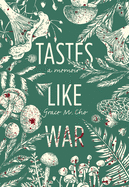
Sociologist Grace M. Cho untangles a menacing snarl of family history in Tastes Like War, a poignant memoir of steadfast love between a troubled mother and her determined daughter. Cho was 15 years old when her mother, Koonja, began showing signs of mental illness and fierce suspicion toward everyone in their small town of Chehalis, Wash., even those once considered friends. Although Cho diagnosed her with schizophrenia from a textbook in 1986, it wasn't until 1994 that a psychiatrist confirmed Koonja's condition, by which time shared and secret traumas had set each member of their family adrift in different directions.
As Cho works to parse "my han--the untranslatable Korean word that refers to 'unresolved resentment against injustice'... or 'knotted grief,' " she follows dark and varied threads into arenas of devastating oppression. She navigates an unreliable mental health industrial complex vacillating between psychoanalytical and biomedical models of treatment, uncovers a history of abusive sex work for Korean women under Japanese and American occupation, and grapples with vicious xenophobia within the United States. But it is Korean food and flavors that help Cho and her mother deal with this painful mess, quite literally like a trail of breadcrumbs.
Cho's persistent memories of the mother she knew as a child, a wizard in the kitchen, reassures Cho that she lives on somewhere in that fragile mind. And eventually, as Koonja instructs Cho in re-creating dishes like the chilled soybean soup kong-guksu and the fish stew saengtae jjigae, glimmers do reemerge. Somehow both mouthwatering and heartbreaking, Tastes Like War is a potent personal history. --Dave Wheeler, associate editor, Shelf Awareness

